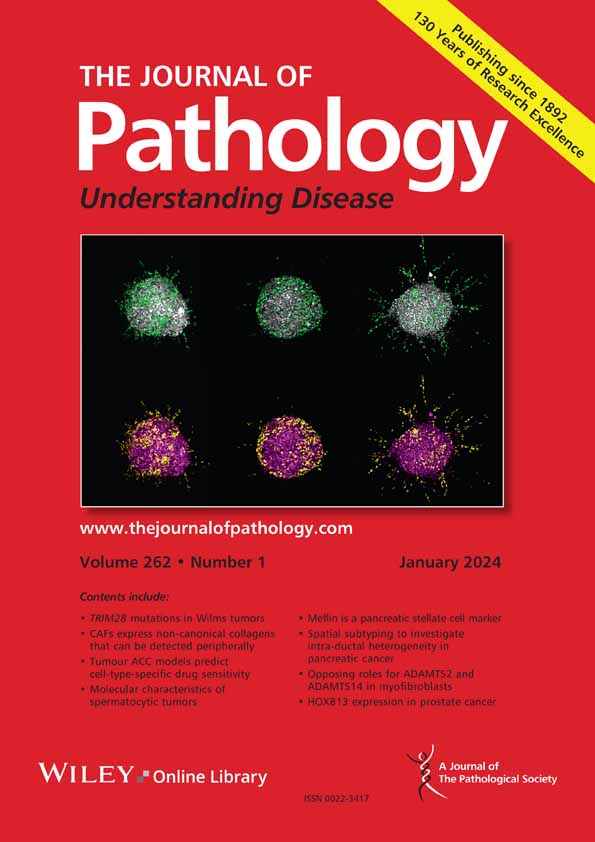求助PDF
{"title":"高脂肪饮食通过PLAT信号调节caf -免疫细胞相互作用影响乳腺癌进展。","authors":"Weihan Li, Jiangshan He, Jingjing Li, Xingyu Xie, Peng Zhou","doi":"10.1002/path.6452","DOIUrl":null,"url":null,"abstract":"<p><p>Breast cancer progression is profoundly influenced by interactions within the tumor microenvironment, particularly between cancer-associated fibroblasts and immune cells. This study investigated how cancer-associated fibroblasts impact immune cells in the context of high-fat diets, focusing on key genes involved in these interactions. By analyzing breast cancer-related single-cell and bulk RNA sequencing data, we identified candidate genes in cancer-associated fibroblasts that influence immune cell behavior. Using the TCGA-BRCA dataset, we assessed the correlation between these genes and patient survival, as well as their role in immune cell infiltration and their association with clinical and immunological features. Our findings revealed significant cellular communication under high-fat diet conditions, with the cancer-associated fibroblast marker gene PLAT emerging as a key player linked to immune cell infiltration. Analysis of patient data from the GEO and TCGA-BRCA datasets revealed that in high-fat diet-induced breast cancer, patients exhibited reduced stromal scores, and stromal, immune, and ESTIMATE scores were significantly associated with clinical outcomes. In vivo murine experiments indicated that high-fat diets promoted tumor-associated macrophage infiltration while inhibiting CD4<sup>+</sup> T-cell activation. In vitro experiments confirmed that reduced PLAT expression facilitated M2 macrophage polarization and promoted cancer cell invasion and migration. Overall, our results highlight that high-fat diets can reshape the tumor microenvironment and accelerate breast cancer progression by modulating cancer-associated fibroblast-immune cell interactions, specifically via PLAT signaling. © 2025 The Pathological Society of Great Britain and Ireland.</p>","PeriodicalId":232,"journal":{"name":"The Journal of Pathology","volume":" ","pages":""},"PeriodicalIF":5.2000,"publicationDate":"2025-09-03","publicationTypes":"Journal Article","fieldsOfStudy":null,"isOpenAccess":false,"openAccessPdf":"","citationCount":"0","resultStr":"{\"title\":\"High-fat diets influence breast cancer progression by modulating CAF-immune cell interactions through PLAT signaling.\",\"authors\":\"Weihan Li, Jiangshan He, Jingjing Li, Xingyu Xie, Peng Zhou\",\"doi\":\"10.1002/path.6452\",\"DOIUrl\":null,\"url\":null,\"abstract\":\"<p><p>Breast cancer progression is profoundly influenced by interactions within the tumor microenvironment, particularly between cancer-associated fibroblasts and immune cells. This study investigated how cancer-associated fibroblasts impact immune cells in the context of high-fat diets, focusing on key genes involved in these interactions. By analyzing breast cancer-related single-cell and bulk RNA sequencing data, we identified candidate genes in cancer-associated fibroblasts that influence immune cell behavior. Using the TCGA-BRCA dataset, we assessed the correlation between these genes and patient survival, as well as their role in immune cell infiltration and their association with clinical and immunological features. Our findings revealed significant cellular communication under high-fat diet conditions, with the cancer-associated fibroblast marker gene PLAT emerging as a key player linked to immune cell infiltration. Analysis of patient data from the GEO and TCGA-BRCA datasets revealed that in high-fat diet-induced breast cancer, patients exhibited reduced stromal scores, and stromal, immune, and ESTIMATE scores were significantly associated with clinical outcomes. In vivo murine experiments indicated that high-fat diets promoted tumor-associated macrophage infiltration while inhibiting CD4<sup>+</sup> T-cell activation. In vitro experiments confirmed that reduced PLAT expression facilitated M2 macrophage polarization and promoted cancer cell invasion and migration. Overall, our results highlight that high-fat diets can reshape the tumor microenvironment and accelerate breast cancer progression by modulating cancer-associated fibroblast-immune cell interactions, specifically via PLAT signaling. © 2025 The Pathological Society of Great Britain and Ireland.</p>\",\"PeriodicalId\":232,\"journal\":{\"name\":\"The Journal of Pathology\",\"volume\":\" \",\"pages\":\"\"},\"PeriodicalIF\":5.2000,\"publicationDate\":\"2025-09-03\",\"publicationTypes\":\"Journal Article\",\"fieldsOfStudy\":null,\"isOpenAccess\":false,\"openAccessPdf\":\"\",\"citationCount\":\"0\",\"resultStr\":null,\"platform\":\"Semanticscholar\",\"paperid\":null,\"PeriodicalName\":\"The Journal of Pathology\",\"FirstCategoryId\":\"3\",\"ListUrlMain\":\"https://doi.org/10.1002/path.6452\",\"RegionNum\":2,\"RegionCategory\":\"医学\",\"ArticlePicture\":[],\"TitleCN\":null,\"AbstractTextCN\":null,\"PMCID\":null,\"EPubDate\":\"\",\"PubModel\":\"\",\"JCR\":\"Q1\",\"JCRName\":\"ONCOLOGY\",\"Score\":null,\"Total\":0}","platform":"Semanticscholar","paperid":null,"PeriodicalName":"The Journal of Pathology","FirstCategoryId":"3","ListUrlMain":"https://doi.org/10.1002/path.6452","RegionNum":2,"RegionCategory":"医学","ArticlePicture":[],"TitleCN":null,"AbstractTextCN":null,"PMCID":null,"EPubDate":"","PubModel":"","JCR":"Q1","JCRName":"ONCOLOGY","Score":null,"Total":0}
引用次数: 0
引用
批量引用

 求助内容:
求助内容: 应助结果提醒方式:
应助结果提醒方式:


